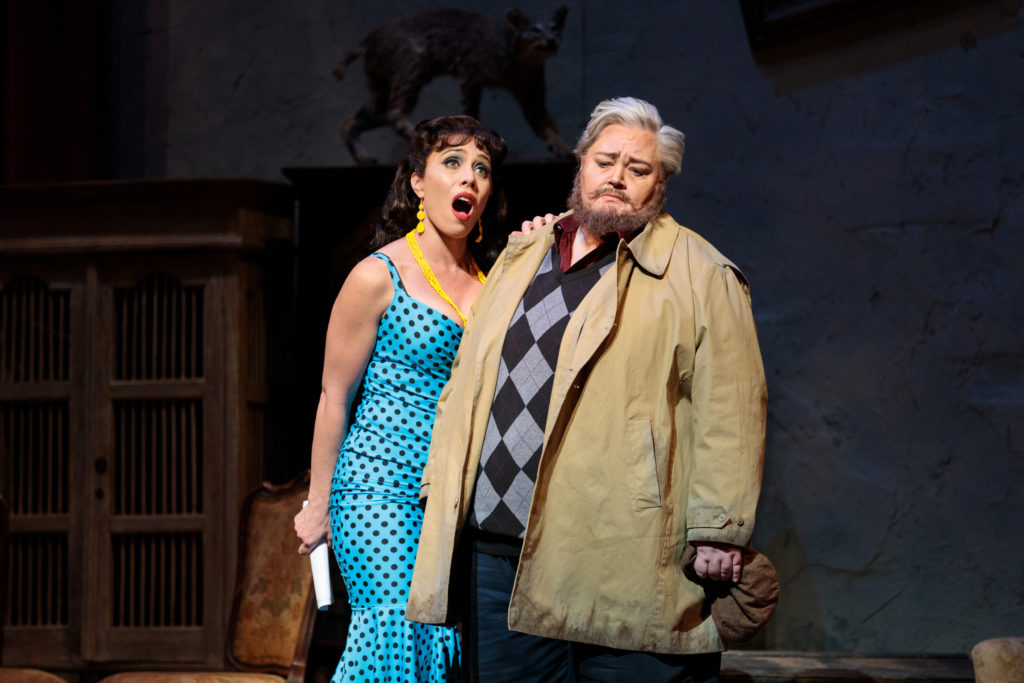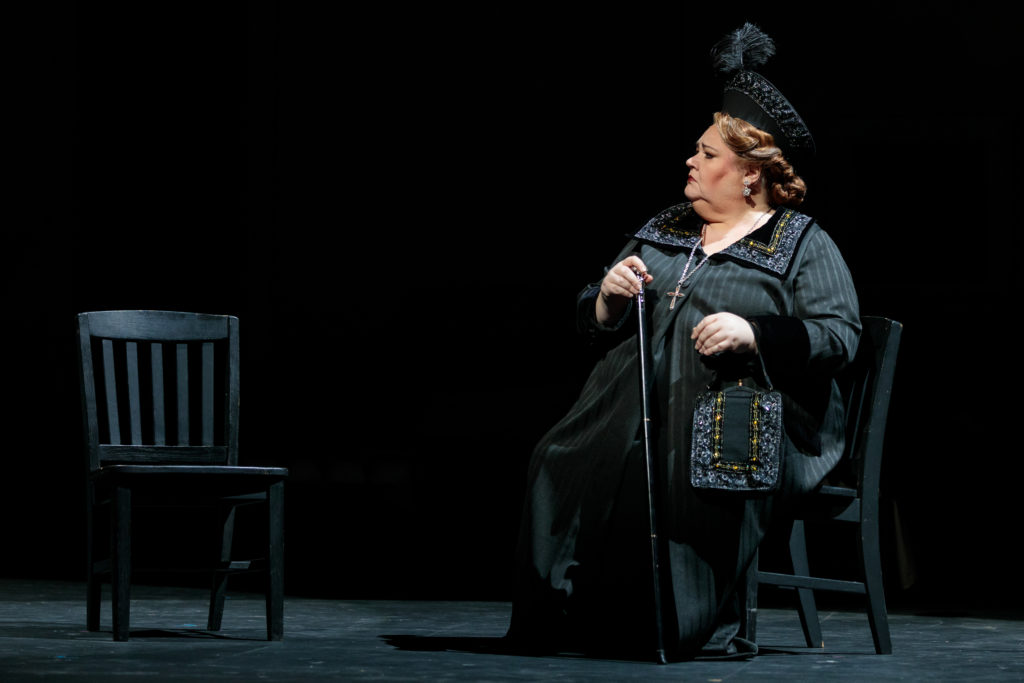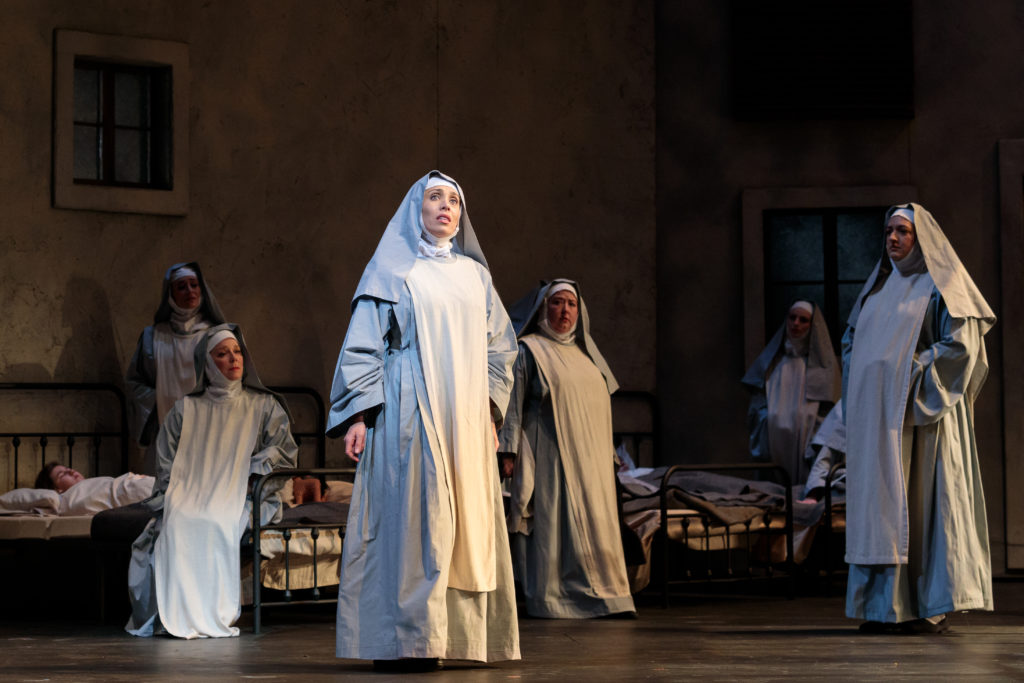San Diego Opera’s Puccini Duo Boldly Balances Tragedy with Comedy
Much of the success of San Diego Opera’s Puccini Duo production that opened Saturday resulted from the amazing versatility two divas, soprano Marina Costa-Jackson and mezzo-soprano Stephanie Blythe.
Costa-Jackson plumbed the agonizing depths of Sister Angelica’s despair as the title character of Puccini’s tragic Suor Angelica and returned after intermission as Lauretta, the sexy teen-ager who can hardly wait wed and bed the handsome Rinuccio in Gianni Schicchi, the composer’s only comic opera. In Suor Angelica, Blythe gave a bone-chilling account of the cruel, emotionally frigid Principessa, but in Gianni Schicchi the mezzo charmed the upper-class Florentine snobs—as well as the San Diego audience—with her deft impersonation of Lauretta’s father, the wily, gregarious Gianni Schicchi. Because these two singers were surrounded by well-chosen casts of strong singers expertly directed by Kyle Lang, these Puccini one-act operas amply rewarded the receptive opening-night audience, enough to forgive San Diego Opera for not presenting all three one-act operas of the composer’s marvelous Il trittico.Gianni Schicchi’s plot is based on impersonation: Gianni Schicchi agrees to impersonate the recently deceased Buoso Donati in order to re-write his will that will dispense his wealth to his avaricious relatives instead of to his intended Franciscan friars. The wily impersonator, of course, leaves the Donati mansion and choice income properties to himself. So what could be more rational than mezzo-soprano Blythe impersonating the baritone role of Gianni Schicchi, which she did with consummate skill.
Describing Blythe’s vocal range as ample is clearly an understatement, considering the power and resonance of her lowest octave, a rich quality any self-respecting baritone could rightly envy. And her confident body language muted Gianni Schicchi’s swagger just enough to convince the smug aristocrats that they could easily manipulate him to their ends. Her Gianni Schicchi triumphed with equal prowess as did her captivating Ulrica in San Diego Opera’s 2014 Ballo in maschera, the company’s most successful Verdi opera in recent decades.
Puccini’s dashing young lover Rinuccio, company newcomer Piotr Buszewski, scored mightily, especially with his charming hymn to the city of Florence “Firenze è come un albero fiorito,” although it appeared that his face mask compromised some of the dynamic power of this rich lyric tenor instrument. His lithe stage presence proved a welcome contrast to those hefty “park and bark” tenors of yore. The golden tones of Marina Costa-Jackson’s supple soprano and her earnest yet coy demeanor gave the opera’s celebrated aria “O mio bambino caro” irresistible impact. Bass-baritone Philip Cokorinos’ Simone, cousin of the deceased and oldest member of the Donati family, gave somber vocal authority to his role, although librettist Giovacchino Forzano left no doubt that Simone’s seniority is devoid of both wisdom and strategy. Only mezzo-soprano Claudia Chapa as Cousin Zita exceeded Cokorinos’ brusque sense of entitlement, smartly fulfilling Forzano’s intentions. Baritone Michael Sokol portrayed both Donati’s physician Maestro Spinellocio and the summoned notary with aptly officious decorum.
Since the members of the Donati family were of a single mind coveting Buoso’s fortune, Kyle Lang choreographed their movements with clever ensemble precision, and his brisk pacing sharpened the opera’s satirical edge. When the physician entered the house to attend the ailing Buoso, the relatives fell into crisp geometric formations that cleverly prevented him from even getting close to his patient. On other occasions Lang positioned the relatives in line across the edge of the stage, each under a bright spotlight airing their greedy expectations.
Tim Wallace’s design of Donati’s spacious bedroom suggested slightly faded luxury with large paintings hung on the walls, some slightly askew, implying a certain neglect during Buoso’s decline, and Ingrid Helton’s flashy costumes for the women–bright colors and large full skirt–looked like they came from a late 1950s Italian fashion show. However, because the original Gianni Schicchi story belongs to the late 13th century, one of Donati’s prized possessions that his family covets is his mule, so translating the setting of this story to the mid-20th century makes the desire for that possession more than slightly comical.
Under the baton of San Diego Opera’s Principal Conductor Yves Abel, the San Diego Symphony gave a polished, beautifully balanced account of Puccini’s scintillating score. This Gianni Schicchi is a production to write home about!
Although Suor Angelica was Puccini’s favorite opera of Il trittico‘s three one-act operas, I think it is safe to say that audiences have seldom affirmed his preference. The opening orchestral strains suggest bucolic contentment as the daily routines of a convent unfold, augmented by the celestial harmonies of the nun’s anthem to the Virgin Mary wafting from the offstage convent chapel. The title character was cut off from her noble family after bearing a child out of wedlock, banished to a remote convent where the young nun has lived for seven years without a word from her family. The opera’s mood shifts radically with the arrival of La Principessa, the august matriarch of Sister Angelica’s family who comes to obtain the nun’s renunciation of her portion of the family fortune and turn it over to a younger sibling who plans to marry a man who is willing to overlook Sister Angelica’s stain on the family name. Desperate to learn about the child she bore and saw only once, Sister Angelica asks the matriarch about the boy, and La Principessa coldly replies that he died of an illness two years earlier. The devastated Sister Angelica rashly concocts and takes a lethal draft to end her suffering, only to realize that she has committed a mortal sin that will prevent her heavenly reunion with her son. To resolve this stark tragedy, the Virgin Mary miraculously appears in a vision and reunites Sister Angelica with her son.
Marina Costa-Jackson’s Sister Angelica, radiant in the opera’s early scene but even more compelling in her plangent sorrow and heart-rending despair in the opera’s climactic moments made the best possible case for staging Suor Angelica. From the tender desolation of her aria “Senza mamma, bimbo, tu sei morto,” Costa-Jackson quickly unleashed her frantic despair as she realized the consequences of her suicide in an astonishing yet commanding vocal tour de force. Stephanie Blythe’s dramatic and vocal gravitas as La Principessa provided the perfect complement to Costa-Jackson’s devastated Sister Angelica. Kyle Lang’s astute direction gave the nuns apt quotidian tasks about the convent to justify their presence around their beloved Sister Angelica. Offstage, their singing along with members of the Opera Chorus gave the more gentle harmonies of Puccini’s sacred music emanating from the chapel a rewarding luster.This production of one-act operas by Giacomo Puccini was presented by San Diego Opera at San Diego Civic Theatre on February 11, 2023. The operas will be repeated in the same venue on February 14, 17, and 19.




I continue to be a fan of Ken .
He always hits the mark.
Ken didn’t miss a thing. As usual his review
was interesting and accurate.